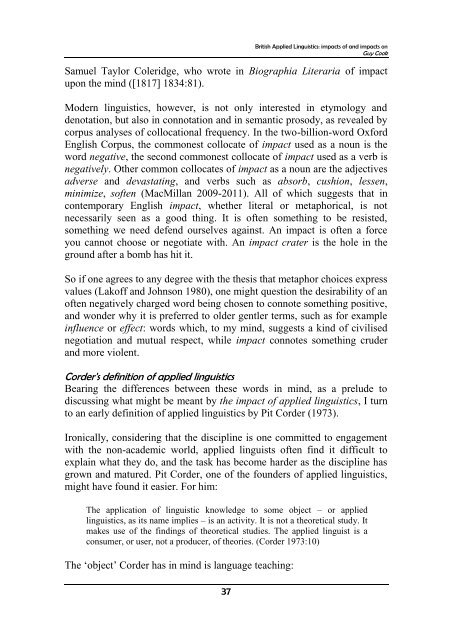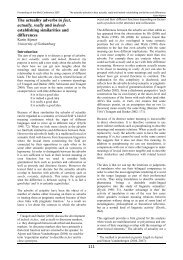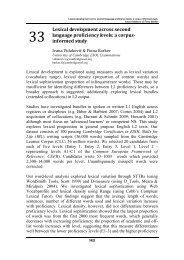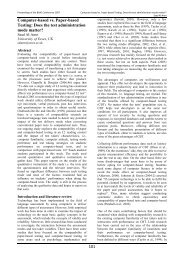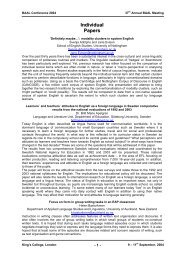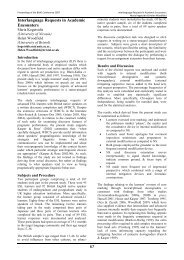Proceedings of the - British Association for Applied Linguistics
Proceedings of the - British Association for Applied Linguistics
Proceedings of the - British Association for Applied Linguistics
You also want an ePaper? Increase the reach of your titles
YUMPU automatically turns print PDFs into web optimized ePapers that Google loves.
37<br />
<strong>British</strong> <strong>Applied</strong> <strong>Linguistics</strong>: impacts <strong>of</strong> and impacts on<br />
Guy Cook<br />
Samuel Taylor Coleridge, who wrote in Biographia Literaria <strong>of</strong> impact<br />
upon <strong>the</strong> mind ([1817] 1834:81).<br />
Modern linguistics, however, is not only interested in etymology and<br />
denotation, but also in connotation and in semantic prosody, as revealed by<br />
corpus analyses <strong>of</strong> collocational frequency. In <strong>the</strong> two-billion-word Ox<strong>for</strong>d<br />
English Corpus, <strong>the</strong> commonest collocate <strong>of</strong> impact used as a noun is <strong>the</strong><br />
word negative, <strong>the</strong> second commonest collocate <strong>of</strong> impact used as a verb is<br />
negatively. O<strong>the</strong>r common collocates <strong>of</strong> impact as a noun are <strong>the</strong> adjectives<br />
adverse and devastating, and verbs such as absorb, cushion, lessen,<br />
minimize, s<strong>of</strong>ten (MacMillan 2009-2011). All <strong>of</strong> which suggests that in<br />
contemporary English impact, whe<strong>the</strong>r literal or metaphorical, is not<br />
necessarily seen as a good thing. It is <strong>of</strong>ten something to be resisted,<br />
something we need defend ourselves against. An impact is <strong>of</strong>ten a <strong>for</strong>ce<br />
you cannot choose or negotiate with. An impact crater is <strong>the</strong> hole in <strong>the</strong><br />
ground after a bomb has hit it.<br />
So if one agrees to any degree with <strong>the</strong> <strong>the</strong>sis that metaphor choices express<br />
values (Lak<strong>of</strong>f and Johnson 1980), one might question <strong>the</strong> desirability <strong>of</strong> an<br />
<strong>of</strong>ten negatively charged word being chosen to connote something positive,<br />
and wonder why it is preferred to older gentler terms, such as <strong>for</strong> example<br />
influence or effect: words which, to my mind, suggests a kind <strong>of</strong> civilised<br />
negotiation and mutual respect, while impact connotes something cruder<br />
and more violent.<br />
Corder's definition <strong>of</strong> applied linguistics<br />
Bearing <strong>the</strong> differences between <strong>the</strong>se words in mind, as a prelude to<br />
discussing what might be meant by <strong>the</strong> impact <strong>of</strong> applied linguistics, I turn<br />
to an early definition <strong>of</strong> applied linguistics by Pit Corder (1973).<br />
Ironically, considering that <strong>the</strong> discipline is one committed to engagement<br />
with <strong>the</strong> non-academic world, applied linguists <strong>of</strong>ten find it difficult to<br />
explain what <strong>the</strong>y do, and <strong>the</strong> task has become harder as <strong>the</strong> discipline has<br />
grown and matured. Pit Corder, one <strong>of</strong> <strong>the</strong> founders <strong>of</strong> applied linguistics,<br />
might have found it easier. For him:<br />
The application <strong>of</strong> linguistic knowledge to some object – or applied<br />
linguistics, as its name implies – is an activity. It is not a <strong>the</strong>oretical study. It<br />
makes use <strong>of</strong> <strong>the</strong> findings <strong>of</strong> <strong>the</strong>oretical studies. The applied linguist is a<br />
consumer, or user, not a producer, <strong>of</strong> <strong>the</strong>ories. (Corder 1973:10)<br />
The ‘object’ Corder has in mind is language teaching:


